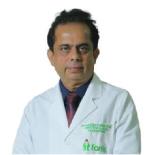About Neurosurgery
What is Neurosurgery
Neurosurgery stands at the forefront of medical science, representing precision, innovation, and a deep understanding of the human brain and nervous system. This specialty is not limited to just brain surgery. It includes diagnosing and treating patients with injuries and disorders of the brain, spinal cord, and peripheral nerves across the body and caters to both adults and children. Neurosurgeons are trained to deal with a wide range of neurological conditions using surgical and non-surgical interventions to restore lost function and improve patients’ quality of life.
Sub-Specialties of Neurosurgery
Neurosurgery includes multiple sub-specialties, each focusing on a specific section of the nervous system and related disorders.
These sub-specialties include:
- Neuro-Oncology: Neuro-oncology diagnoses and treats brain and spinal cord tumors, both malignant and benign.
- Spine Surgery: Spine surgery deals with the diagnosis and treatment of disorders affecting the spine, including herniated discs, deformities, tumors, and injuries.
- Pediatric Neurosurgery: Pediatric neurosurgery focuses on the treatment of neurological diseases in children, ranging from congenital conditions to tumors, epilepsy, and injuries.
- Functional Neurosurgery: Functional neurosurgery specializes in the surgical management of movement disorders.
- Vascular Neurosurgery: Vascular neurosurgery deals with disorders of the blood vessels in the brain and spinal cord.
- Skull Surgery: Skull surgery involves the treatment of tumors, lesions, and abnormalities located at the base of the skull.
- Peripheral Nerve Surgery: Peripheral nerve surgery focuses on disorders affecting the peripheral nerves.
- Neurotrauma: Neurotrauma specialists treat physical injuries of the brain, spinal cord, and other parts of the nervous system.
Techniques and Procedures Used by Neurosurgeons
A neurosurgeon is skilled in and uses several surgical techniques, including:
- Craniotomy: It involves opening the skull to access the brain for neurological interventions.
- Deep Brain Stimulation (DBS): It is used to treat movement disorders and tremors by implanting electrodes to regulate abnormal neural activity.
- Minimally Invasive Procedures: It uses small incisions to insert surgical tools with a camera and perform surgery. For example, endoscopy, endovascular surgery, etc.
- Open Surgery: It involves cutting skin and tissues so a surgeon can get a full view of the organs.
- Microsurgery: It includes reconstructing damaged skin, muscles, and tissues through a microscope.
- Radiosurgery: It involves radiation therapy that produces a similar result as an actual surgical procedure.
- Chronic Pain Interventional Procedures: It utilizes pain-blocking techniques to help make daily activities easier.
- Neuroimaging: It uses procedures such as MRI, CT, and functional imaging techniques to visualize complex anatomical structures and plan surgical approaches with precision.
Conditions Treated Via Neurosurgery
Neurosurgery includes diagnosing, treating, and managing various conditions affecting the brain, spinal cord, peripheral nerves, and related structures.
The conditions commonly treated by neurosurgeons include:
- Brain Tumors: This specialty gliomas, meningiomas, pituitary tumors, acoustic neuromas, and metastatic brain tumors
- Spinal Disorders: Neurosurgery helps treat various spinal conditions, including herniated discs, spinal stenosis, degenerative disc disease, spinal cord compression, spinal deformities (e.g., scoliosis, kyphosis), and spinal cord tumors.
- Cerebrovascular Disorders: Neurosurgery plays a significant role in the treatment of cerebrovascular disorders, including cerebral aneurysms, arteriovenous malformations (AVMs), cavernous malformations, moyamoya disease, and stroke.
- Neurotrauma: Neurosurgery is involved in the acute management of traumatic brain injuries (TBIs), spinal cord injuries (SCIs), and peripheral nerve injuries.
- Functional Disorders: Neurosurgery provides treatments for various functional disorders of the nervous system, including Parkinson’s disease, essential tremor, dystonia, epilepsy, and chronic pain syndromes.
- Peripheral Nerve Disorders: Neurosurgery addresses multiple peripheral nerve disorders, including nerve entrapment syndromes (e.g., carpal tunnel syndrome, etc.), traumatic nerve injuries, nerve tumors (e.g., schwannomas, neurofibromas, etc.), and brachial plexus injuries.
- Hydrocephalus: Neurosurgery is involved in the management of hydrocephalus, a condition characterized by the accumulation of cerebrospinal fluid (CSF) within the brain, leading to increased intracranial pressure.
- Skull Base Disorders: Neurosurgery deals with conditions affecting the skull base, including skull base tumors (e.g., pituitary adenomas, acoustic neuromas, meningiomas, etc.), cranial nerve disorders, and vascular abnormalities (e.g., carotid artery aneurysms, etc.).
When to See a Neurosurgeon?
The following symptoms require evaluation by a neurosurgeon:
- Persistent headaches accompanied by nausea and vomiting
- Vision and speech changes
- Weakness or numbness
- Back or neck pain with bowel/bladder dysfunction
- Seizures
- Loss of coordination
- Memory loss and behavioral changes
- Tremors and movement difficulties
- Suspected or diagnosed brain and spinal tumors, malformations, or aneurysms
- Gait disturbances
Neurosurgery is a dynamic and indispensable specialty within the field of medicine, offering hope to patients dealing with various neurological conditions. From life-saving interventions to innovative treatments, neurosurgeons at Fortis continue to push the limits of medical science and exhibit their unwavering commitment to the pursuit of excellence in patient care and scientific advancement.
Our Team of Experts
View allMedical Procedures for Neurosurgery
View allOur patient’s stories
View allRelated Specialities
Other Specialities
-
Explore Hospitals for Neurosurgery
Fortis Escorts Heart Institute, New Delhi Fortis Escorts Hospital, Faridabad Fortis Hospital, Noida Fortis Escorts Hospital, Amritsar Fortis Escorts Hospital, Jaipur Fortis Flt. Lt. Rajan Dhall Hospital, Vasant Kunj Fortis Hospital - Greater Noida Fortis Hospital BG Road Bangalore Fortis Nagarbhavi Bangalore Fortis Hospital CG Road Bangalore Fortis Hospital, Rajajinagar, Bengaluru Fortis Hospital, Anandpur, Kolkata Fortis Hospital, Kalyan, Mumbai Fortis Hospital, Ludhiana Fortis Hospital, Mohali Fortis Hospital, Mulund, Mumbai Hiranandani Fortis Hospital, Vashi, Mumbai Fortis Hospital, Shalimar Bagh, New Delhi Fortis Memorial Research Institute, Gurgaon S L Raheja Hospital, Mumbai Fortis Hospital Mall Road, Ludhiana -
Explore Doctors for Neurosurgery by Hospital
Doctors in Fortis Escorts Heart Institute, New Delhi Doctors in Fortis Escorts Hospital, Faridabad Doctors in Fortis Hospital, Noida Doctors in Fortis Escorts Hospital, Amritsar Doctors in Fortis Escorts Hospital, Jaipur Doctors in Fortis Flt. Lt. Rajan Dhall Hospital, Vasant Kunj Doctors in Fortis Hospital - Greater Noida Doctors in Fortis Hospital BG Road Bangalore Doctors in Fortis Nagarbhavi Bangalore Doctors in Fortis Hospital CG Road Bangalore Doctors in Fortis Hospital, Rajajinagar, Bengaluru Doctors in Fortis Hospital, Anandpur, Kolkata Doctors in Fortis Hospital, Kalyan, Mumbai Doctors in Fortis Hospital, Ludhiana Doctors in Fortis Hospital, Mohali Doctors in Fortis Hospital, Mulund, Mumbai Doctors in Hiranandani Fortis Hospital, Vashi, Mumbai Doctors in Fortis Hospital, Shalimar Bagh, New Delhi Doctors in Fortis Memorial Research Institute, Gurgaon Doctors in S L Raheja Hospital, Mumbai Doctors in Fortis Hospital Mall Road, Ludhiana


























